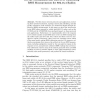Free Online Productivity Tools
i2Speak
i2Symbol
i2OCR
iTex2Img
iWeb2Print
iWeb2Shot
i2Type
iPdf2Split
iPdf2Merge
i2Bopomofo
i2Arabic
i2Style
i2Image
i2PDF
iLatex2Rtf
Sci2ools
118
click to vote
EWSN
2010
Springer
2010
Springer
On the Mechanisms and Effects of Calibrating RSSI Measurements for 802.15.4 Radios
Abstract. Wireless sensor network protocols and applications, including those used for localization, topology control, link scheduling, and link quality estimation, make extensive use of Received Signal Strength Indication (RSSI) measurements. In this paper we show that inaccuracies in the RSSI values reported by widely used 802.15.4 radios, such as the CC2420 and the AT86RF230, have profound impact on these protocols and applications. Furthermore, we experimentally derive the response curves which translate actual RSSI values to the raw RSSI readings that the radios report and show that they contain non-linear and even noninjective regions. Fortunately, these curves are consistent across radios of the same model, making RSSI calibration practical. We present a calibration mechanism that removes the artifacts in the raw RSSI measurements, including ambiguities created by the non-injective regions in the response curves, and generates calibrated RSSI readings that are linear. This calib...
Computer Networks | EWSN 2010 | Raw Rssi | RSSI | RSSI Readings |
| Added | 13 Oct 2010 |
| Updated | 13 Oct 2010 |
| Type | Conference |
| Year | 2010 |
| Where | EWSN |
| Authors | Yin Chen, Andreas Terzis |
Comments (0)

